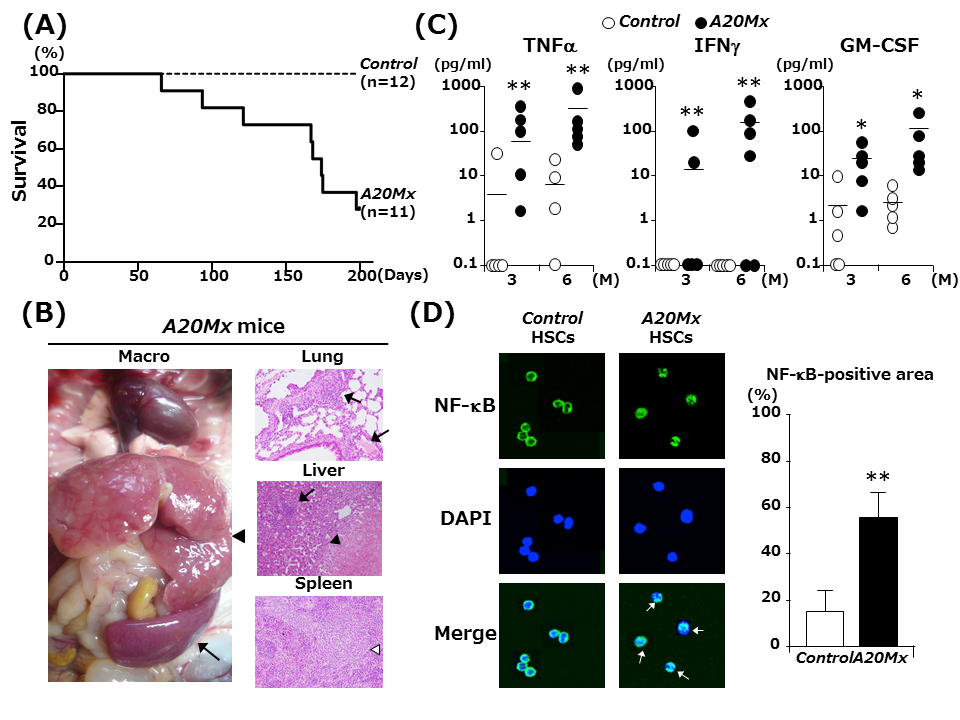|
Acquired A20 (Tnfaip3) deficiency in mice B6;129P2-Tnfaip3<tm1Homy>/HomyRbrc (RBRC05494)B6;129P2-Tnfaip3<tm1.1Homy>/HomyRbrc (RBRC05495)Courtesy of Hiroaki Honda, M.D., Ph.D. (A) Kaplan-Meier survival curves of control and A20flox/flox MxCre+ (A20Mx) mice. A20Mx mice died sooner than control mice. (B) Macroscopic appearance and pathological images of an A20Mx mouse at 6 months after birth. Left panel: the enlarged liver and spleen are indicated by an arrowhead and an arrow, respectively. Right panel: infiltrated myeloid cells in the lung and liver, granuloma formation in the liver, and destruction of spleen architecture are indicated by arrows, an arrowhead, and a white arrowhead, respectively. (C) Serum concentrations of pro-inflammatory cytokines in control and A20Mx mice. *p < 0.05 and **p < 0.01 (Student’s t-test). (D) Left panel: intracellular localization of NF-κB in control and A20Mx hematopoietic stem cells (HSCs) detected by immunofluorescence staining. Right column: percentages of the NF-κB-positive areas are shown. **p < 0.01 (Student’s t-test). |
| The signaling molecule A20, also known as tumor necrosis factor α-induced protein 3 (Tnfaip3), is a ubiquitin-modifying enzyme that restrains the inflammatory response by regulating nuclear factor-κB (NF-κB) activation. In these pathways, via tumor necrosis factor receptor 1 (TNFR1), interleukin-1 receptor, and Toll-like receptor, A20 binds substrate proteins such as receptor-interacting serine-threonine kinase 1, the ubiquitin-conjugating enzyme UBCH5, TNFR-associated factor 6, and IκB kinase-γ. A20 is considered to attenuate NF-κB signaling by the deubiquitylating activity of its ovarian tumor domain and also by the ubiquitin ligase (E3) and ubiquitin-binding activity of its zinc finger motifs [1, 2]. |
| Classical A20 knockout mice are hypersensitive to TNF, develop severe inflammation, and die prematurely [3]. Studies using mice with a conditional allele of A20 showed that A20 deficiency in B cells exaggerates their response to NF-κB activation and results in the development of autoantibodies [4, 5]. Intestinal epithelial cell-specific A20 knockout mice show increased susceptibility to colitis [6]. Recently, Honda and colleagues reported that mice in which A20 expression can be induced and ablated preferentially in hematopoietic cells (A20Mx mice) exhibit myeloid proliferation, B cell apoptosis, and anemia with the overproduction of proinflammatory cytokines [7]. Concentrations of TNF-α, interferon (IFN) γ, and GM-CSF were significantly higher in A20Mx mice than in control mice (figure C). As indicated by arrows in the left panel of figure D, NF-κB signals were detected in the nucleus significantly more in A20Mx hematopoietic stem cells (HSCs) than in control HSCs, where they were detected mainly in the cytoplasm. This conditional A20 knockout mouse strain provides an opportunity to clarify the role of A20 in various organs. |
| Depositor | : | Hiroaki Honda, M.D., Ph.D.Research Institute of Radiation Biology and MedicineHiroshima University | |
| Strain name | : | B6;129P2-Tnfaip3<tm1Homy>/HomyRbrc | |
| RBRC No. | : | RBRC05494 | |
| Strain name | : | B6;129P2-Tnfaip3<tm1.1Homy>/HomyRbrc | |
| RBRC No. | : | RBRC05495 | |
| References | : | [1] | Hymowitz SG, Wertz IE. A20: from ubiquitin editing to tumour suppression. Nat Rev Cancer; 10(5):332-41, 2010. |
| [2] | Ma A, Malynn BA. A20: linking a complex regulator of ubiquitylation to immunity and human disease. Nat Rev Immunol.; 12(11):774-85, 2012. | ||
| [3] | Lee EG, Boone DL, Chai S, Libby SL, Chien M, Lodolce JP, Ma A. Failure to regulate TNF-induced NF-kappaB and cell death responses in A20-deficient mice. Science; 289(5488):2350-4, 2000. | ||
| [4] | Hövelmeyer N, Reissig S, Xuan NT, Adams-Quack P, Lukas D, Nikolaev A, Schlüter D, Waisman A. A20 deficiency in B cells enhances B-cell proliferation and results in the development of autoantibodies. Eur J Immunol.; 41(3):595-601, 2011 | ||
| [5] | Tavares RM, Turer EE, Liu CL, Advincula R, Scapini P, Rhee L, Barrera J, Lowell CA, Utz PJ, Malynn BA, Ma A. The ubiquitin modifying enzyme A20 restricts B cell survival and prevents autoimmunity. Immunity; 33(2):181-91, 2010. | ||
| [6] | Vereecke L, Sze M, Mc Guire C, Rogiers B, Chu Y, Schmidt-Supprian M, Pasparakis M, Beyaert R, van Loo G. Enterocyte-specific A20 deficiency sensitizes to tumor necrosis factor-induced toxicity and experimental colitis. J Exp Med.; 207(7):1513-23, 2010. | ||
| [7] | Nagamachi A, Nakata Y, Ueda T, Yamasaki N, Ebihara Y, Tsuji K, Honda Z, Takubo K, Suda T, Oda H, Inaba T, Honda H. Acquired deficiency of A20 results in rapid apoptosis, systemic inflammation, and abnormal hematopoietic stem cell function. PLOS One; 9(1):e87425, 2014. | ||
| May 2014 Contact: Shinya Ayabe, Ph.D. Experimental Animal Division, RIKEN BioResource Center All materials contained on this site may not be reproduced, distributed, displayed, published or broadcast without the prior permission of the owner of that content. |






